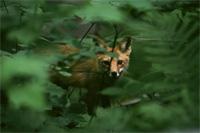Foxes In Foxrock

What was a fox doing last week walking around the car park of a supermarket in the afternoon – in the suburb of Dublin, Foxrock? Shoppers were amazed to see it in daylight showing no fear of humans at all.
This fox was probably born last April, one of a litter of cubs born to a vixen which holds territory in the area. Foxes are now very common in Dublin having become established here in the 1930s and there has been a major expansion in numbers since the 1980s, as suburban Dublin ate up great swathes of surrounding countryside. It is reckoned that fox territories are a mere 20 hectares in the city as compared to up to 1000 hectares in rural areas.
Fox cubs stay with their parents until they are fully grown which is about seven months. At this stage they have learned all the parents can teach them and are now becoming a burden on the territory, which can support only one fox family. So they leave. The young males are made to feel definitely unwanted although one or two of the young females of the litter are tolerated as they can help with the rearing of next year's cubs.
So the fox in the supermarket car-park is a young male adult setting out in life looking for a territory where he can support a wife and kids. And as Dublin is pretty full of foxes such a task is not easy, hence the confusion of the fox. Where to go? Adult foxes mark their territory with strong smelling urine and it's very obvious to a questing fox if he is trespassing on some other fox's space. Mortality of such foxes is very high and up to 80 per cent of them die before their first birthday.
If the Foxrock fox succeeds in getting planning permission for a den he can expect a long and happy life of at least four years and plenty of food to eat. Urban foxes aren't in the least bit picky about what they consume – they scavenge in dustbins, dig up lawns for earthworms, prowls through back gardens raiding the dog's bowl and they are not above stealing cartons of milk left on doorsteps– in those dwindling areas that still rejoice in early morning milk deliveries.
In rural areas too foxes have a very catholic diet. While infamy is heaped upon them for raiding hen-houses and killing every last hen although they only actually need one to eat, they do balance the food chain somewhat by dining on rats, mice, young rabbits, beetles and on such vegetarian fare as blackberries and apples. They scavenge on the carcasses of dead sheep and lambs, and while they are not above killing an unprotected newborn lamb, most of the mutton foxes eat is already dead before they get to it.
City people in general tend to like foxes and put out food for them in their gardens. Rural people on the other hand regard them as a threat to their livestock and have no time for them. At this time of year many of the dispersing young adults get killed on the roads so it really is the cute fox who is able to procure a territory, mark it with his scent and go on the pull for a vixen during the dark nights of late December. There are no housing lists for foxes, it truly is the survival of the fittest.
